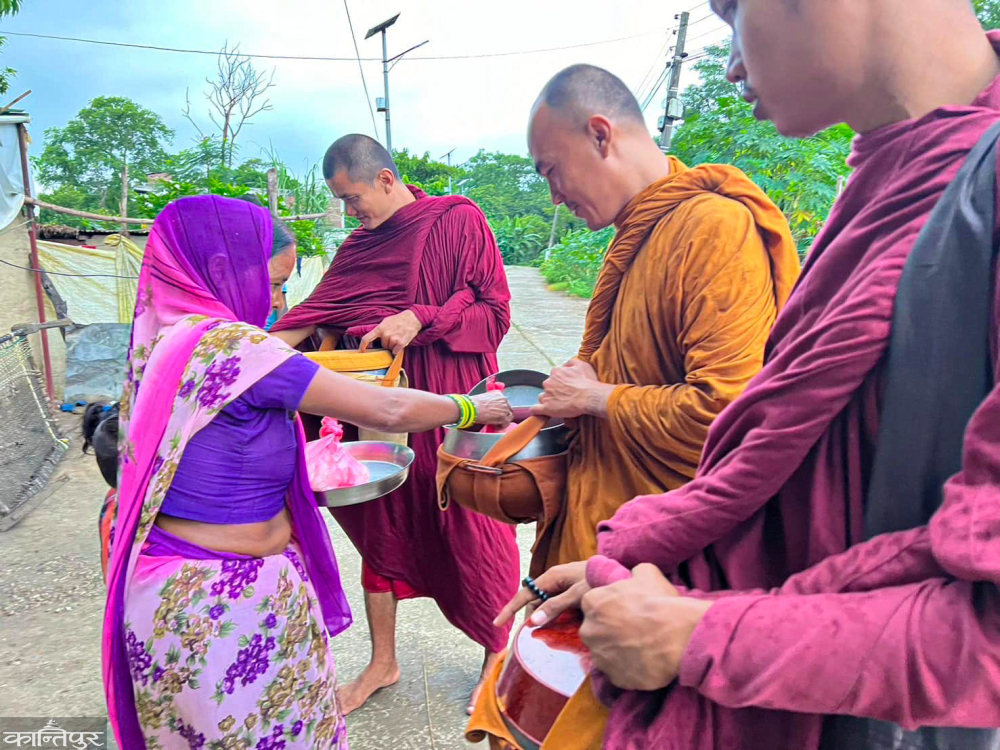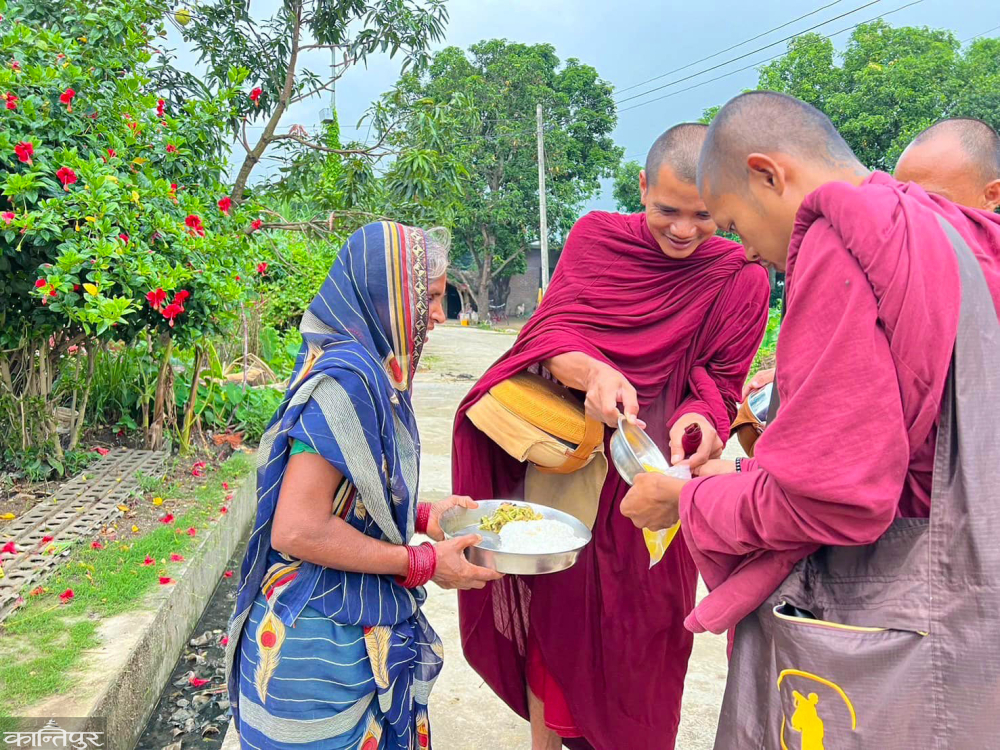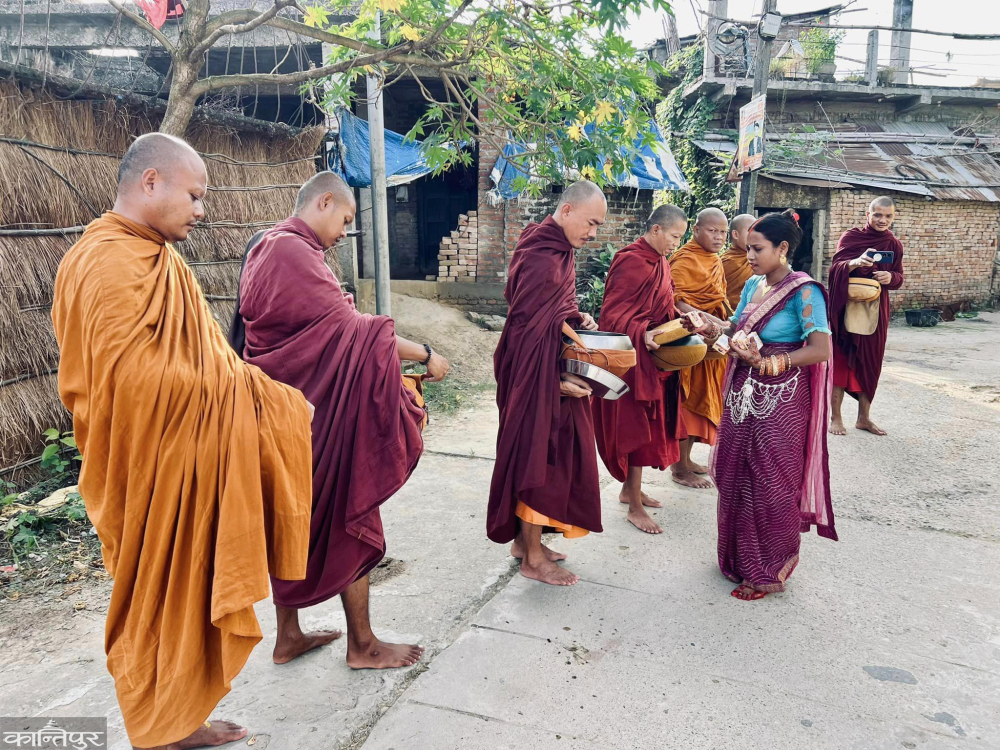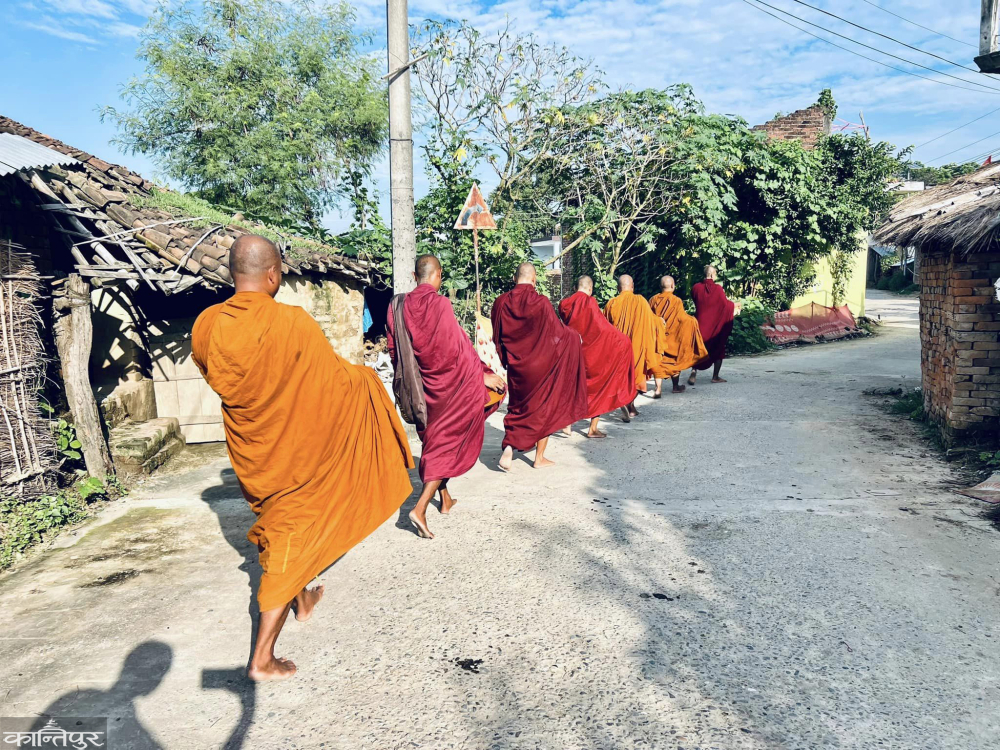Thai monks in a rain forest doing alms in Lumbini

We use Google Cloud Translation Services. Google requires we provide the following disclaimer relating to use of this service:
This service may contain translations powered by Google. Google disclaims all warranties related to the translations, expressed or implied, including any warranties of accuracy, reliability, and any implied warranties of merchantability, fitness for a particular purpose, and noninfringement.




Thai monk Dantachitta arrives in the villages around Lumbini every day after 7am with alms bowls. Coming from Thailand's Khorat province, he cooks and eats the vegetables he has brought from the locals. The 10 monks who came with him are running the kitchen while walking from village to village. They eat before 12 noon and then walk to pray.

They did not ask for money. Now 17 monks from different 5 provinces of Thailand are living in Lumbini for 3 months. The second important festival of Buddhists started from Asar Purnima day. Buddhist sites Lumbini, Kapilvastu and Nawalparasi have monks and upasampadas living in rain.
In Buddhism, the three months from June to Asoj Purnima are called Varshavasa . It is customary for monks-nuns and upasampadas to live in the rain forest because they will be forgiven for their unknowing mistakes and weaknesses while practicing the backbone of Buddhism. It is believed that a monk who lives in the rain will accumulate virtue. During the rainy season, meditation is done in the evening and in the morning and Paritran is recited. Puja is performed by sharing knowledge to the local people and performing Buddha Gun, Dharma Gun, Sang Gun and Dharma Deshana . 
During the rainy season, they eat one meal in the morning . As much as possible, they ask for alms from local residents and eat. "I have come to live in Lumbini, the birthplace of Buddha," said Phramaha Kriditin Tarapon, a monk who came from Chiang Mai, Thailand. "I will collect harmony, compassion and brotherhood from here and take it to Thailand and distribute it," he said.
There are 7 monks in the Royal Thai Vihara of Lumbini and 10 in the Shakyamuni Vihara, 2 monks in the Golden Temple of Myanmar. Similarly, one in Sri Lanka Vihar and two in Mahabodhi Society are residing in the Varshavas . There are 3 in Navamaitri Mahavihar, 3 in IBS . 4 in Tilaurakot of Kapilvastu, 4 in Nigrodharam and 4 in Ramgram of Nawalparasi are residing in Barshavas . 40 monks from Thailand, Myanmar, Sri Lanka and Nepal are residing in the three places. 
Among the 10 parts of the Mahabhaggapali, which is part of the Vinaya Pitaka taught by the Lord Buddha, there are mentions of the rules of rainy season and the rules of difficult Chibar donation in 3 and 4, said Bhikshu Sri Bajir, the deputy professor of Lumbini Buddhist University. The tradition of Buddhist parivrajaka monks staying in one place or monastery without going anywhere is called Varshavasa . This tradition has been going on since the time of Buddha. 'The rainy season is a rule made in special circumstances,' he said, 'that's why it is considered special.' He said that the rules of rain shelter have been made. He said that the monks living in the rain forest share knowledge with the local people, teach meditation and the importance of charity. In Varshavasa, the monks spend three months in one vihara, temple, studying and meditating. Due to special circumstances, one cannot go out for more than one week if there is any work. He said that if he leaves, he will be considered to have left the barsha home.
Some of the monks upasampadas live in the rain forest even at the request of worshipers. For that they invite . At this time, it is customary for worshipers to donate all the necessary expenses of chivar (yellow clothes), food, clothing and medicine to the monks. This is called Charutpratya . Help is accepted by doing Chartu Pratya Pooja. After 3 months, the worshipers who invite for the rain residence again come and donate chivar to the monk. They worship . Accumulate merit . On the occasion of the end of the monks' three-month rain residence, the worshipers of the local viharas have a tradition of happily celebrating the difficult Chibar Utsav. 
The chibar rule obtained there is donated to the monk who lives in a rain forest . Rainy weather from Asoj to Kattik Purnima is known as Dakhi Chibarotsava . After that the shower is complete . "Thai monks come to Lumbini to stay in the rain bath," said Phra Bodhi Wids, head monk of the Thai monastery in Lumbini, "17 people have come this year." In Buddhism, only followers of the Theravada sect live in the rain bath. 
 प्रकाशित : आश्विन १, २०८१ १८:२७
प्रकाशित : आश्विन १, २०८१ १८:२७

 २४.१२°C काठमाडौं
२४.१२°C काठमाडौं










